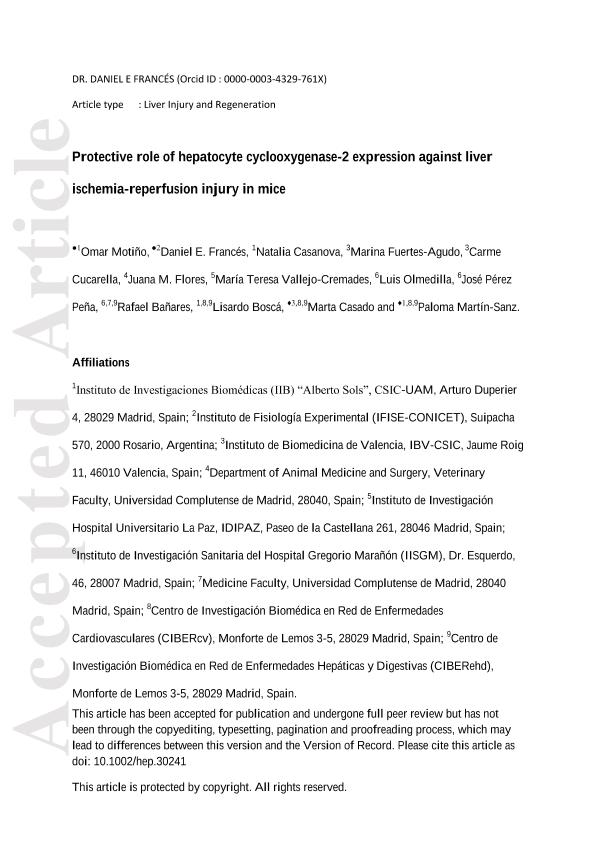Mostrar el registro sencillo del ítem
dc.contributor.author
Motiño García-Miguel, Omar

dc.contributor.author
Frances, Daniel Eleazar Antonio

dc.contributor.author
Casanova, Natalia
dc.contributor.author
Fuertes Agudo, Marina
dc.contributor.author
Cucarella, Carme
dc.contributor.author
Flores, Juana M.
dc.contributor.author
Vallejo Cremades, María Teresa
dc.contributor.author
Olmedilla, Luis
dc.contributor.author
Pérez Peña, José
dc.contributor.author
Bañares, Rafael
dc.contributor.author
Boscá, Lisardo
dc.contributor.author
Casado, Marta
dc.contributor.author
Martin Sanz, Paloma

dc.date.available
2020-12-15T20:06:30Z
dc.date.issued
2019-08
dc.identifier.citation
Motiño García-Miguel, Omar; Frances, Daniel Eleazar Antonio; Casanova, Natalia; Fuertes Agudo, Marina; Cucarella, Carme; et al.; Protective Role of Hepatocyte Cyclooxygenase-2 Expression Against Liver Ischemia–Reperfusion Injury in Mice; John Wiley & Sons Inc; Hepatology (Baltimore, Md.); 70; 2; 8-2019; 650-665
dc.identifier.issn
0270-9139
dc.identifier.uri
http://hdl.handle.net/11336/120520
dc.description.abstract
Liver ischemia and reperfusion injury (IRI) remains a serious clinical problem affecting liver transplantation outcomes. IRI causes up to 10% of early organ failure and predisposes to chronic rejection. Cyclooxygenase-2 (COX-2) is involved in different liver diseases, but the significance of COX-2 in IRI is a matter of controversy. This study was designed to elucidate the role of COX-2 induction in hepatocytes against liver IRI. In the present work, hepatocyte-specific COX-2 transgenic mice (hCOX-2-Tg) and their wild-type (Wt) littermates were subjected to IRI. hCOX-2-Tg mice exhibited lower grades of necrosis and inflammation than Wt mice, in part by reduced hepatic recruitment and infiltration of neutrophils, with a concomitant decrease in serum levels of proinflammatory cytokines. Moreover, hCOX-2-Tg mice showed a significant attenuation of the IRI-induced increase in oxidative stress and hepatic apoptosis, an increase in autophagic flux, and a decrease in endoplasmic reticulum stress compared to Wt mice. Interestingly, ischemic preconditioning of Wt mice resembles the beneficial effects observed in hCOX-2-Tg mice against IRI due to a preconditioning-derived increase in endogenous COX-2, which is mainly localized in hepatocytes. Furthermore, measurement of prostaglandin E2 (PGE2) levels in plasma from patients who underwent liver transplantation revealed a significantly positive correlation of PGE2 levels and graft function and an inverse correlation with the time of ischemia. Conclusion: These data support the view of a protective effect of hepatic COX-2 induction and the consequent rise of derived prostaglandins against IRI.
dc.format
application/pdf
dc.language.iso
eng
dc.publisher
John Wiley & Sons Inc

dc.rights
info:eu-repo/semantics/openAccess
dc.rights.uri
https://creativecommons.org/licenses/by-nc-sa/2.5/ar/
dc.subject
PGE2
dc.subject
COX-2
dc.subject
HYPOXIA
dc.subject
LIVER
dc.subject
transplantation
dc.subject.classification
Otras Ciencias de la Salud

dc.subject.classification
Ciencias de la Salud

dc.subject.classification
CIENCIAS MÉDICAS Y DE LA SALUD

dc.title
Protective Role of Hepatocyte Cyclooxygenase-2 Expression Against Liver Ischemia–Reperfusion Injury in Mice
dc.type
info:eu-repo/semantics/article
dc.type
info:ar-repo/semantics/artículo
dc.type
info:eu-repo/semantics/publishedVersion
dc.date.updated
2020-11-19T21:45:31Z
dc.journal.volume
70
dc.journal.number
2
dc.journal.pagination
650-665
dc.journal.pais
Estados Unidos

dc.journal.ciudad
Baltimore
dc.description.fil
Fil: Motiño García-Miguel, Omar. Consejo Superior de Investigaciones Científicas; España. Universidad Autónoma de Madrid; España
dc.description.fil
Fil: Frances, Daniel Eleazar Antonio. Consejo Nacional de Investigaciones Científicas y Técnicas. Centro Científico Tecnológico Conicet - Rosario. Instituto de Fisiología Experimental. Universidad Nacional de Rosario. Facultad de Ciencias Bioquímicas y Farmacéuticas. Instituto de Fisiología Experimental; Argentina
dc.description.fil
Fil: Casanova, Natalia. Consejo Superior de Investigaciones Científicas; España. Universidad Autónoma de Madrid; España
dc.description.fil
Fil: Fuertes Agudo, Marina. Consejo Superior de Investigaciones Científicas; España. Instituto de Biomedicina de Valencia; España
dc.description.fil
Fil: Cucarella, Carme. Consejo Superior de Investigaciones Científicas; España. Instituto de Biomedicina de Valencia; España
dc.description.fil
Fil: Flores, Juana M.. Universidad Complutense de Madrid; España
dc.description.fil
Fil: Vallejo Cremades, María Teresa. Hospital Universitario La Paz. Instituto de Investigación; España
dc.description.fil
Fil: Olmedilla, Luis. Hospital Gregorio Marañón Instituto de Investigación Sanitaria; España
dc.description.fil
Fil: Pérez Peña, José. Hospital Gregorio Marañón Instituto de Investigación Sanitaria; España
dc.description.fil
Fil: Bañares, Rafael. Hospital Gregorio Marañón Instituto de Investigación Sanitaria; España
dc.description.fil
Fil: Boscá, Lisardo. Consejo Superior de Investigaciones Científicas; España. Universidad Autónoma de Madrid; España
dc.description.fil
Fil: Casado, Marta. Consejo Superior de Investigaciones Científicas; España. Instituto de Biomedicina de Valencia; España
dc.description.fil
Fil: Martin Sanz, Paloma. Consejo Superior de Investigaciones Científicas; España. Instituto de Biomedicina de Valencia; España
dc.journal.title
Hepatology (Baltimore, Md.)

dc.relation.alternativeid
info:eu-repo/semantics/altIdentifier/url/http://doi.wiley.com/10.1002/hep.30241
dc.relation.alternativeid
info:eu-repo/semantics/altIdentifier/doi/http://dx.doi.org/10.1002/hep.30241
Archivos asociados
